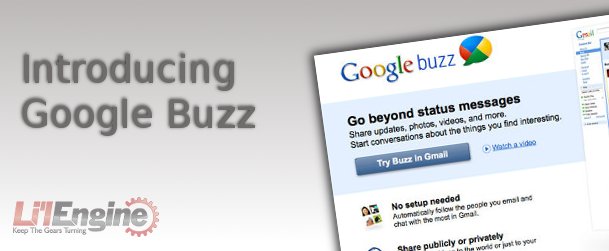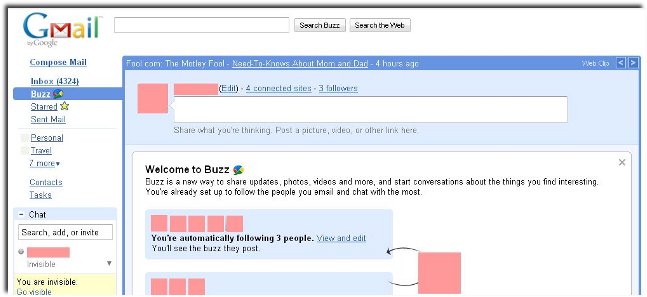Google Buzz

If you’ve checked your gmail account in the past few days, then you’ve probably gone straight to a screen asking if you want to set up Google Buzz. If you’re worried about a complex set-up procedure, then stop worrying. It’s extraordinarily easy to set up because you’re walked through every step and it’s all very clear.
But perhaps before you get all gung-ho on what should be a new and easy way to tie together contacts and share social networking information, you should know up front that Google Buzz feels very “wide open,” and that’s because, well, it is. Google has already taken some heat from a blogger who found out the hard way that Buzz was revealing her present social networking information to her ex-husband because he is, for better or worse, one of her “most frequent” contacts. Your most frequent contacts are automatically allowed access to your Google Reader unless you explicitly block them. “Frequent” contacts are also those who email you frequently, whether you want them to or not.
If you have a Google public profile, you can edit it to keep these people out, but if you don’t have a public profile, the fix was just implemented February 12, so there is still the possibility of some bugginess. The problem was that during internal testing, Google didn’t so much have to deal with people who hate or want to stalk each other. If you feel like you’re in danger of being stalked, outed, or whatever, then it may be worthwhile to hang back for a few days and see where the Buzz privacy tools take you. Google has made the option for not displaying follower information on public profiles more visible. It has also added the ability for users to block followers who have not created a Google Profile. At this point, email addresses are still visible for users your gmail account has had correspondence with, so the possibility of spamming or otherwise unwanted email may be a problem.
OK, so assuming you don’t expect to be stalked, and you don’t have confidential media sources that could be made public, you’ll have no trouble at all setting up on Buzz. If you don’t have a Google public profile, it’s easy to make one and there’s a button for it right on the Buzz setup. You don’t have to put much in the way of personal information on your Google public profile, and it may be a good idea to keep it fairly low on information at this point until Buzz has been used enough that unintended effects start showing up and being dealt with.
The whole idea with Buzz is keeping you even more connected with your social network on the internet. Once you bring up Buzz from within gmail, you’ll see thumbnails of those you’re following in place of the pink squares you see in the screen shot. If you click on one of their thumbnails, you’ll see the people they’re following who have public profiles. You’ll also see how many people that person is following who don’t have public Google profiles. This isn’t a problem for most people, but jealous spouses and significant others could potentially work up a good head of neurotic steam worrying about such things. Then again, Facebook can engender such situations too.

Google Buzz is also available to schools and businesses that use Google Apps, and for those users, there will be extra features for intra-organizational sharing.
You can use Buzz on your phone, which is cool because you can add location data to your Buzzes by adding a geographical tag if you want. Suppose, for example, you’re wondering if that Thai restaurant you just passed is any good. You could create a Buzz and geo tag it, and any friends who have been there can tell you if it’s good or not.
The ultimate goal, according to Google is to make it a fully open distributed conversation platform. Developers can get in on the action too by going to the Google Buzz labs and learning how to participate.
With the launch of Google Buzz, Google announced that it bought Aardvark for $50 million. Aardvark is a social search company and a question answering service, and Google bought them to boost their location-based services that come along with Buzz. Aardvark scans profiles of members to help answer questions based on a topic or location. Aardvark already operated through gchat mostly, and its founders came from Google to begin with.
New as Buzz is, the chewing up and spitting out has already begun (as it did with the Apple iPad and the Droid, etc.). And it would appear that privacy is generating the most, well, buzz. The mobile version lets you track where your friends are based on their latest buzzes. This is a little disconcerting to people like journalists, who worry about people learning where you are at any time of the day. There are, of course options to turn this off, but are there unseen loopholes? Could you, for example, send enough gmail messages from a bogus gmail account to someone to be automatically classified as a “frequent contact” and then have automatic access to their whereabouts? Google says that they’re tweaking settings to upgrade the privacy controls.
As potentially groundbreaking as Buzz might end up being, it probably won’t take much away from the two other big social players, Facebook and Twitter. Twitter has rapidly grown into a business promotional tool, and Facebook is where people get together to play a lot of third party app games. Neither is going anywhere any time soon.







